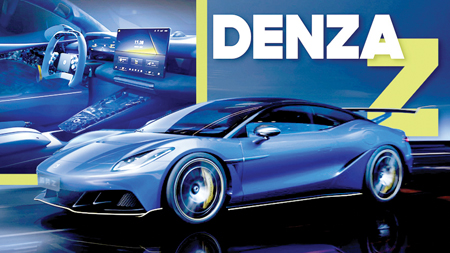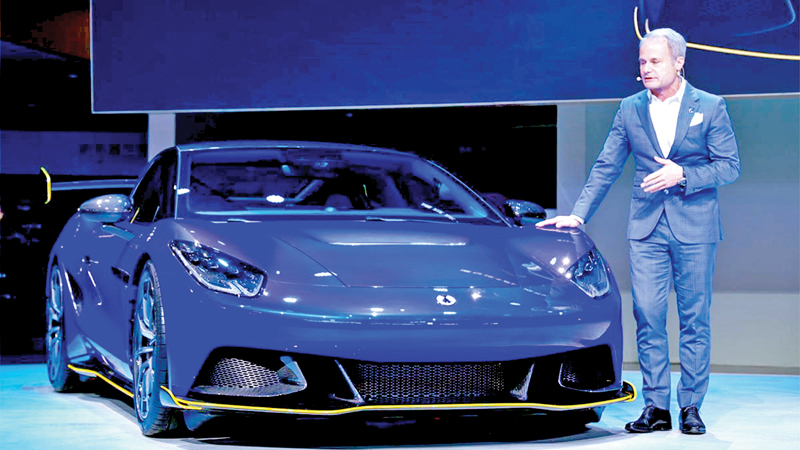Chinese electric vehicle giant BYD has already beaten out long-standing frontrunner Tesla in sales of electrified vehicles. And now it is coming for luxury sports cars.
BYD’s premium Denza line last week unveiled the Z, a flashy new deep-blue model that points to the company’s ambitions to rival higher-end Western brands such as Porsche and Mercedes-Benz.
The launch came at the opening of Auto Shanghai, China’s largest automobile show – which has drawn dozens of domestic and foreign carmakers, as well as crowds of journalists, to a sprawling exhibition centre in the country’s financial hub.
Ahead of its unveiling, the Denza Z sat shrouded in a black cover on the display floor. Flanked by an entourage, Wang Chuanfu, BYD’s founder and one of the country’s most celebrated entrepreneurs, was seen at the display.
Carmakers jockeyed for attention with flashy displays featuring their latest models and duelling press conferences announcing new releases. The 10-day gathering shines a spotlight on the technological prowess of China’s booming and cutthroat electric vehicle (EV) sector, which has shocked Western rivals not just with the speed of its innovation and growth, but also the quality of its value offerings.
Leader in EV sector
As the global auto industry is roiled by US President Donald Trump’s tariffs on car imports to the United States, China’s EV sector has become a hot spot — with global brands seeking opportunities to recalibrate strategies, including enhancing partnerships, to try to regain their former dominant position in the world’s largest car market.
 BYD is the clear leader in China’s EV sector, having surpassed Tesla in global sales last year. It continues to build on its edge over the American EV maker in the domestic market, where the vast majority of its cars are sold.
BYD is the clear leader in China’s EV sector, having surpassed Tesla in global sales last year. It continues to build on its edge over the American EV maker in the domestic market, where the vast majority of its cars are sold.
On Tuesday, Tesla reported a larger-than-expected drop in quarterly revenue as it faces headwinds including Trump’s escalating trade war and a consumer backlash over CEO Elon Musk’s role in the administration. Its overall sales fell 9 percent, while its core business of selling cars fell 20 percent. Net income, the strictest definition of its profitability, plunged 71 percent compared with a year earlier.
The Denza Z has been hotly anticipated after images of the prototype leaked online earlier this year and a company official confirmed that the model would be “maxed out in tech and luxury.”
Started over a decade ago as a joint venture with Mercedes but now fully owned by BYD, the Denza brand was launched in Europe earlier this month.
While the BYD core brand is known for its more affordable electric and hybrid vehicles, its Denza line shows the company’s ambitions to expand its portfolio and use its extensive resources to aim for other segments of the market, analysts say.
“BYD only knows how to play offense. Their consistent and frequent vehicle and feature launches keep their competitors on their heels, while their lowest in-class cost structure lets them price their products much more aggressively,” Tu Le, founder and managing director of the consultancy firm Sino Auto Insights, told CNN.
The Denza launch comes at a vulnerable time for Porsche, which hasn’t been able to “find a bottom” on their sales decline in China, he added. The German luxury sports car maker said in its 2024 annual report that its sales in the country were down 28 percent last year, compared to 2023, which it attributed to “the continuing challenging economic situation.”
Pricing
CNN has reached out to BYD for information about the pricing of the Denza Z. Last month, the high-end Denza line’s N9 flagship SUV went on sale with a starting price of 389,800 Yuan (US$ 53,453). By comparison BYD’s popular Song Plus SUV, a more basic model, starts around US$ 18,500. (Both models are not yet available here).
BYD also sells luxury EVs under Yangwang, a brand in the premium 1-million-yuan (US$ 137,000) segment which earlier this month passed the symbolic milestone of selling its 10,000th vehicle. The latest model, the U8L SUV, was launched at the Auto Shanghai.
The latest launches follow what has already been a banner year for the Shenzhen-based company. Already China’s top automaker, BYD has set an ambitious target to double its sales outside China to more than 800,000 cars in 2025.
BYD plans to keep its cost advantage by assembling the vehicles in many local markets, its chairman said in an earnings call last month, according to Reuters.
The European Union last year slapped hefty duties on EV imports from China over what it describes as unfair subsidies in the Chinese market. A 100 percent tariff imposed by the former Biden administration last year effectively barred Chinese competitors from the US market – even before Washington and Beijing became locked in their current trade war.
This year has already seen a number of advances for the company, which last year accounted for roughly a third of China’s sales of electrified vehicles, including hybrids.
Surge in sales
In February, BYD launched the “God’s Eye,” an advanced driver-assistance system rivalling Tesla’s Full Self-Driving feature, at no extra cost for most of its cars in China. Last month, the company unveiled a battery charging technology that it says adds 400 Km of range in five minutes, outpacing Tesla’s Superchargers, which take 15 minutes to add 320 Km.
BYD reported a 60 percent surge in sales in the first quarter of this year, selling just over one million new-energy vehicles (NEVs) in the first three months of 2025 – including battery-powered cars, hybrids and commercial vehicles, according to a CNN calculation based on its latest stock exchange filing.
The company had US$ 107 billion in sales for 2024, a 29 percent jump from the previous year, on deliveries of 4.27 million cars, including hybrids. By comparison, Tesla’s 2024 revenue was US$ 97.7 billion, and it delivered 1.79 million battery-powered vehicles. Its annual deliveries declined for the first time last year by 1.1 percent.
Tesla held a 6.1 percent market share of the domestic market, according to the China Passenger Car Association. BYD makes both battery-powered cars as well as hybrids, while Tesla makes only fully electric vehicles powered by batteries. Its battery-powered EV shipments of 1.76 million vehicles were marginally short of Tesla’s. (CNN)




